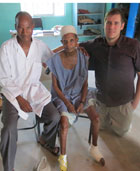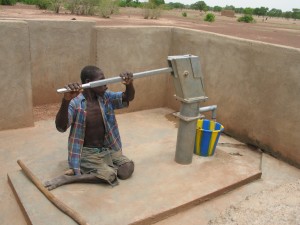Water and sanitation access: increasing hope for persons with disabilities
 While completing field interviews in rural Mali, I met a young man with disabilities who was living in his parents’ home. As a child he contracted a disease which left him unable to walk. As my colleagues and I began to interact with him, he excitedly showed us a complex system of wires and old batteries that he had assembled. When he touched two of the wires together, several small lights illuminated across an old wooden board. A wide smile flashed across his face as he showed us this amazingly complex system he had designed from the simplest of materials.
While completing field interviews in rural Mali, I met a young man with disabilities who was living in his parents’ home. As a child he contracted a disease which left him unable to walk. As my colleagues and I began to interact with him, he excitedly showed us a complex system of wires and old batteries that he had assembled. When he touched two of the wires together, several small lights illuminated across an old wooden board. A wide smile flashed across his face as he showed us this amazingly complex system he had designed from the simplest of materials.
As the conversation continued, we were informed that this young man had almost never left his parents’ home. When we asked the reasons for this, his mother immediately discussed the stigmatization and dangers he would face in the community. She explained that some may attribute his impairment to demonic forces and as a result their family would be the targets of extreme discrimination.
On another occasion, my colleagues met a young woman with disabilities in a rural village. She explained that after she was born she was rejected by her parents and was taken in by a relative. However, her relatives insisted that she live in the small granary at the exterior of their compound isolated from the rest of the family. She also informed us about a strongly-held traditional belief which persists in her community that targets woman with disabilities (especially cognitive disabilities). According to this belief, if a man has sexual relations with a woman with disabilities it is believed that he will gain great riches. She proceeded to share how she is raped multiple times each night by her neighbors.
For the past two years, I have managed a disability inclusion project in partnership with World Vision and Messiah College. I have been confronted with numerous stories like these throughout the countries I have visited. These stories bring to light the numerous obstacles that many persons with disabilities face.
Water as a universal need
When World Vision begins to work in a new community, the first interventions are typically water-focused. The reasoning for this is quite clear: water is essential. It is very difficult to have a successful agriculture, health, education or even economic project without access to a clean water source.
Since water is a daily necessity, people will spend time accessing it. It is estimated by WaterAid that the average African spends three hours per day fetching water. Persons with disabilities often spend more time on this task due to the difficulty of manipulating a full, heavy water container. By spending more time on this activity, there is less time available for other worthwhile endeavors such as education.
Cultural significance of water
Water also plays an important cultural role. For many young women, the ability to fetch water is a prerequisite for having a family. On one occasion, we interviewed a young woman with visual impairments to ask if she ever tried to fetch water; her mother quickly interrupted and said that it would be impossible for her daughter to do so. However, after her mother had left, the young woman informed us that she often sneaks out at night to practice fetching water because she knows that she will never have a family if she is unable to do this daily task.
Personal dignity and independence
 On another visit, our team was designing wooden latrine chairs for persons with disabilities. As part of this process, we asked a young woman to test the chair. While we were explaining how to use it, she immediately began to cry. We thought that we had overstepped a cultural boundary by discussing intimate issues such as latrine use, but she interrupted our apologies to express her gratitude. The young woman told us that she must rely on her family members to squat and rise up from the latrine. This simple chair gave her the ability to deal with her personal needs alone for the first time.
On another visit, our team was designing wooden latrine chairs for persons with disabilities. As part of this process, we asked a young woman to test the chair. While we were explaining how to use it, she immediately began to cry. We thought that we had overstepped a cultural boundary by discussing intimate issues such as latrine use, but she interrupted our apologies to express her gratitude. The young woman told us that she must rely on her family members to squat and rise up from the latrine. This simple chair gave her the ability to deal with her personal needs alone for the first time.
The World Health Organization estimates that more than one billion people live with some form of disability. Of this one billion, many are excluded from their communities and reliant upon others due to inadequate access to water and sanitation. From my experience, the seemingly mundane tasks of fetching water and accessing a latrine play a much deeper role than we may first think. Increased accessibility in these areas not only removes physical barriers; it can play a part in removing cultural ones as well.
Article by Nathaniel Kamban, Project Manager for WASH & Disability, Collaboratory for Strategic Partnerships and Applied Research, Messiah College




